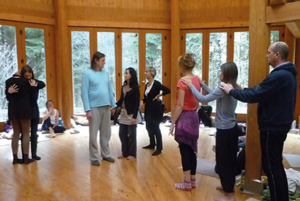 Family Constellations is a powerful and efficient way to uncover and often resolve hidden connections that keep you bound to your family of origin. Families have their own “laws” that govern how we live our lives, including loyalty to family, carrying unexpressed feelings, unspoken “truths” or “replacing” forgotten or excluded family members.
Family Constellations is a powerful and efficient way to uncover and often resolve hidden connections that keep you bound to your family of origin. Families have their own “laws” that govern how we live our lives, including loyalty to family, carrying unexpressed feelings, unspoken “truths” or “replacing” forgotten or excluded family members.
It’s important to respect this work and not use it “lightly,” out of idle curiosity, especially when you are going to have your own constellation done. Of course, you can always participate in this work as a witness/observer – if you just want to satisfy your curiosity and familiarize yourself with this process.
Here are some suggestions that will help you to prepare for your own constellation.
1. It’s best to have one serious or important issue to address in your constellation. Something trivial might be better suited for conventional therapy.
Remember, the power of your intention, of your pain and your energy is what drives and fuels this work. The more you are actively involved and connected – the stronger and more powerful your constellation will be.
2. Think of your issue. Can you distill it to one or two sentences? The more precise and clear the definition of your issue, the more focused, powerful and effective your constellation will be.
Some examples might be “I am stuck in my career. I want clarity about what to do”.
“I am struggling with my relationship with significant other, not sure how to proceed”.
“I have difficult relationship with my parents”.
“I have a life long history of depressions”.
“I have a medical condition”.
“I stuggle with financial problems”.
“Something is blocking me and no matter what I do, I feel stuck”.
3. One to two weeks before your constellation be very mindful and notice what’s happening in your life. It’s not uncommon that things will “start moving” the moment you decide to do your constellation. Keep track of things, you might start getting insights even before the workshop begins.
4. Contemplate what you know about your family. If you have access to family members, try to learn anything that could disrupt “normal” family life.
Here are some ideas or things to contemplate (written by Chris Walsh):
It is useful to know the basic facts about your family i.e. who had special fates i.e. dying young or having difficult chronic illnesses and to think about who belongs to your family system. Those we might overlook, who are still part of a family system include:
— Children, including aborted or stillborn children and those who have died early.
— Brothers & sisters, including stillborn children and those who have died early.
— The parents and their siblings, including stillborn children and those who have died early.
— The grandparents
— Sometimes one of the great-grandparents and, at times, ancestors even further back.
— Everybody – and this is most important – who made room to the advantage of the above members. This includes, in particular, former partners of parents or grandparents, as well as all those whose misfortune or death brought the family an advantage or gain.
— Victims of violence and murder by any members of the family.
— Sometimes people who have saved the life of a family member.This information can be useful. But don’t get frantic trying to find it all out. Often only part of this information is needed to do a constellation.
5. Make sure that you are well rested the day before constellation.
Looking forward to see you there!
